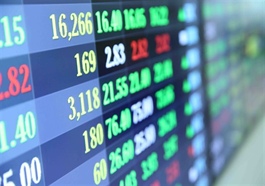Local ETFs draw foreign attention
Local ETFs draw foreign attention
The domestic exchange-traded fund VFMVN Diamond (HoSE: FUEVFVND) on Tuesday issued an additional 300,000 certificates to raise the total amount of certificates to 148.3 million.

The issuance helped boost the value of certificates listed on the Ho Chi Minh Stock Exchange to VND1.483 trillion (US$63.9 million) from VND1.48 trillion.
As of September 6, the net asset value (NAV) of the fund was VND1.9 trillion, equal to VND12,884.58 ($0.56) per certificate.
The fund debuted on HoSE on May 12 at VND11,693.36 per certificate with charter capital of VND102 billion.
The fund has recently become a target for foreign investors, especially Taiwan-based investment fund CTBC Vietnam Equity Fund. The Taiwanese fund will buy 21 million certificates of VFMVN Diamond between September 7 and October 6.
The Taiwanese fund in late August reported it had raised $160 million to invest in the Vietnamese equity market, targeting high-potential listed companies on the Ho Chi Minh and Ha Noi stock exchanges. In addition, part of the funding would flow into VFMVN Diamond ETF, which allows foreign investors to buy the stocks that have run out of foreign ownership limit (FOL) in the VN-Diamond Index on HoSE.
The market has reportedly reacted positively to the appearance of the Taiwanese fund in Viet Nam on expectations the fund will boost the price of the stocks listed in VFMVN Diamond ETF’s portfolio.
The Vietnamese ETF on Monday reported there were 14 stocks in its portfolio. The biggest heavyweights were retailer Mobile World Investment (MWG), tech group FPT Corp (FPT), Techcombank (TCB), VPBank (VPB), Vietinbank (CTG), Military Bank (MBB) and Phu Nhuan Jewellery JSC (PNJ).
To capitalise on the investment by CTBC Vietnam Equity Fund, domestic securities firms and investors have reportedly bought shares of the 14 companies in advance.
Since late August, Mobile World Investment shares have gained as much as 15.6 per cent, Techcombank shares have increased by as much as 10 per cent and VPBank shares have risen 11 per cent.
Le Quang Minh, analysis director at Mirae Asset Viet Nam Securities Co, said foreign investment funds would buy fund certificates at exchange-traded funds (ETFs) because they were not bound by the foreign ownership limit (FOL) rules.
“Their (foreign investors) purchases will help increase the market liquidity, especially boosting the trading volume in the stocks targeted by ETFs, and lift share prices,” he said.
Nguyen The Minh at Yuanta Viet Nam Securities Co said ETF certificates were quite attractive in Taiwan and that could explain why the Taiwanese fund was interested in buying the Vietnamese fund’s certificates.
“Investment from Taiwan may increase in the near future through the strong development of domestic ETFs,” he forecast.
However, the ETF capital would not flow into Viet Nam in short term, instead, the funds would have long-term plans, Nguyen Minh Hanh, ETF director at SSI Asset Management (SSIAM), said.
Foreign investment funds would have to pay a premium for the same stock compared to domestic investors, he said.
“Foreign funds will have to keep their decisions stand by depending on the quality of the target stocks and how much the premium is,” he said. “Investors won’t be happy if they lose once the purchase is done.”
Minh also said that a new source of capital always helped boost market morale, especially when large-cap stocks in the VN30 basket account for 70 per cent of the market’s total capitalisation.
“At the moment, the Taiwanese fund has little impact on the overall market as its size cannot match the Vietnamese market’s,” he added. “But this is still a good chance for Viet Nam to draw the attention of Taiwanese investors.”
According to analysts, the valuation of the Vietnamese stock market is about 20 per cent lower than other markets in the region. But it is not a decisive factor to attract foreign investors.
On April 9, 2018, the VN-Index hit its all-time high of 1,204.33 points but profit growth has slowed down and outpaced the decline of the market since then, making Vietnamese shares much cheaper than regional markets.
Foreign investors have not paid much attention to Vietnamese stocks because the local market is still at the frontier level, while accounting standards are very different from international ones. Foreign funds will be drawn if market prospects are good and profitable.































